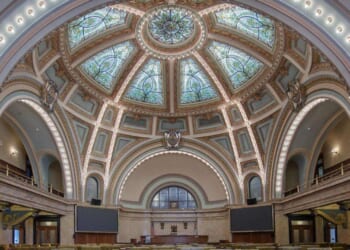Typically, the baddies in a James Bond story would meet a fitting end, such as being sucked out of the window of an aircraft mid-flight. Yet Klaus Schwab, despite sharing an origin story worthy of a Bond villain, with his businessman father sent on assignment to Switzerland by the Third Reich, is neither an arms dealer nor a gold magnate. Instead, he made a comfortable living over a lengthy career, first as an academic and, for the last fifty-four years, by organising conferences. Bond villains are supposed to have enigmatic middle names like Stavro, whereas Mr Schwab’s is Martin. But that hasn’t stopped plenty of people imagining him as something of a Blofeld archetype.
At the age of 87, Schwab is now finally stepping down as head of the World Economic Forum’s board, having founded the talking shop in 1971. Presumably he will now live out his days peaceably somewhere in the Swiss or German Alps. To those who have cast him as the machiavellian puppet-master behind an elite plan to reorder humanity, there must be an element of bathos to such a quiet shuffling-off. Surely, he should be trying to cryogenically preserve himself in a lair deep in the mountains?
In truth, 87 is still a remarkable age for somebody still to be leading an international NGO. If the leadership of the WEF were a position of genuine political power, it is likely that aspiring rivals would have ousted the mild-mannered German academic long before he entered his dotage. As it happens, he is being replaced by a former foreign minister of Norway, the culmination of a planned transition process that began last year.
It was not only the fact that the WEF was Schwab’s baby that ensured he remained in position so long after he reached a normal retirement age. For all of his obvious lack of charisma, there was a mystique to Schwab — one that seemed to grow with his age. So long as the corporate membership fees kept rolling in, and the celebrities and politicians and CEOs kept turning up at Davos every year, there seemed little reason to change a winning formula.
Originally founded as the European Management Forum, Schwab was selected by the European Commission to organise a symposium for European businessmen. The idea was to discuss management practices and introduce European bosses to the latest American theories. In practice, the junket’s setting at Davos in the Rhaetian Alps was a big part of the draw, with ample opportunity to ski and enjoy the facilities of the resort’s luxury hotels on one’s company expense account. It was destined to become an annual event, and in its second iteration in 1972, it attracted the Luxembourgeoise Prime Minister, the first of a steady stream of heads of state and government from around the world.
The early seventies was a time when the postwar years of economic growth appeared to be coming to an end, when Western Europeans began pinning their hopes for the future on intra-European cooperation. This was an era in which European trade associations proliferated across all sectors of the economy and academia, justifying semi-annual meetings in picturesque locations across the original six members of the EEC.
Davos man embodied the coagulation of national elites from different countries into a common international elite
So whereas there were specific groups for the leaders of companies who manufactured ball bearings or brake calipers, the EMF would serve as the talking shop for the leaders of the very largest companies across all sectors. Politicians were invited along to add to the prestige of the occasion, and access to powerful decision-makers helped justify the ticket price.
Over the course of the 1980s, the ratio of politicians to businessmen grew, and the focus of the annual events shifted away from commercial management and toward the management of complex cross border issues. But it was after the Cold War came to an end that the WEF truly came into its own, with the world no longer being divided into competing blocs. This was the era in which corporations would begin to think of themselves as “global citizens”, helping to solve the problems that the world faced as equal partners with governments.
With the ideological defeat of the socialist left, it was also the era in which a new wave of nominally centre-left politicians emerged who in principle embraced capitalism and big business. They were happy to accept the extended hand of large corporations who were offering to focus on the same problems of social inequality, global warming (as it was still referred to in the early nineties) and third world poverty.
For the annual Davos meetings, this meant that commercial attendees could play the role of statesmen for a few days. And it was not only a convergence of politicians and businessmen. In the new post-ideological world, governments of the developed world increasingly outsourced governance and policy-making to a raft of arms-length bodies. Changes in the rules around international aid shifted the bulk of development spending away from direct budgetary assistance, toward grants to organisations delivering specific projects and support. These changes created a whole new sector of non-governmental and quasi-governmental organisations that would fit in alongside the private and public sectors. These “stakeholders” would play an increasing role in the WEF’s annual meetings.
“Davos man” became the soubriquet for the kind of person who now attended the WEF’s annual conference: individuals who could shift seamlessly between business, government and the grey areas in the middle. Davos man embodied the coagulation of national elites from different countries into a common international elite, along with the growing conformism and consensus within the world’s developed countries about how best to manage their affairs.
The first group of people to define themselves in opposition to this consensus were the anti-globalist left, defined by thinkers such as Naomi Klein and the ageing Noam Chomsky. However these groups concentrated their ire on organisations such as the World Trade Organisation and the G8 or G7 meetings of the leaders of rich countries. The leftists may have been locked out of institutional office by the turn of the millennium, but they could still tell the difference between groupings with real economic and political power and a social gathering.
But its status as a meeting between world’s most powerful CEOs and political leaders made Davos a by-word for the way in which political and economic power around the world had changed since the end of the Cold War. The 2008 financial crisis, and its successor debt crises in Europe, brought the annual meetings additional public attention. Increasingly cynical populations began to take note of this forum which combined the politicians they had elected with the financial services sector they held responsible for their nations’ economic calamities.
Yet perversely, to a certain type of person, this only seemed to add to the meetings’ appeal. In an increasingly “them and us” political atmosphere, there were still benefits to being one of “them” on an individual basis or, at least, to being seen as one of “them”. That was available, if you worked for an organisation with the expense budget that covered the costs of attendance at Davos.
Blanket lockdowns and the race to develop vaccines seemed to a lot of people like exactly the kind of policies the Davos set stood for
Reasonably enough, the public assumes that when powerful people get together, they are up to something, especially when it comes to the noxious mingling of businessmen and politicians. It seems absurd to suggest that such people would gather merely for the hell of it and because they enjoy staying in a hotel and hobnobbing. But in reality, truly powerful people at the WEF’s meetings only number a few dozen at most. The other thousands of people who make their way there each year are people with a far more tenuous claim to political or financial prestige. These people are upper-middle management of service sector corporations, European civil servants, comms people at national trade associations and representatives of provincial authorities. It is those people to whom Klaus Schwab has really been selling a dream all of these years.
More recently, this has seen WEF conferences descend into self-parody. Newspaper cartoons and online memes depict hedge fund managers being torn between competing break-out sessions fretting about economic inequality or third world debt. These may have been created for people to laugh at, but the WEF is self-consciously aimed at the sort of people who see such jokes and wish it were at their own expense. Davos allows these people to feel like they are contributing to the solution to intractable problems. The message is that all the world’s ills can be fixed from the top down, if only the very intelligent people were put in charge of fixing them — people such as you, dear attendee.
If the wave of electoral populism beginning in 2016 was in part a reaction against this kind of person, then the pandemic would present the opportunity for a vengeful counter-reaction. Or so the story went. Blanket lockdowns and the race to develop vaccines seemed to a lot of people like exactly the kind of policies the Davos set stood for: hugely intrusive restrictions on personal liberties and economic activity in the name of the greater good, with a top-down, technology-driven solution giving way to a new way of living. This appeared to be very similar to much of the sustainability agenda favoured by the WEF and its members.
Schwab for his part appeared positively giddy about the whole thing, and his “Great Reset” idea seemed to be almost deliberately designed to antagonise people whose trust in society itself was at breaking point.
Once again, the same corrosive feedback mechanism came into play. Apparently, the WEF had planned Covid-19 all along and had unleashed it onto an unthinking world in order to cement the rule of a shadowy ruling class. This was a patently absurd idea but during those fraught, paranoid months, it was one that slowly bled from a conspiratorial fringe and into the consciousness of apolitical middle-aged people via WhatsApp groups and Facebook. Inevitably, this was followed by knowing, middle-brow mockery. For an organisation that exists to sell tickets to conferences that are designed to make attendees feel important, it was Manna from heaven.
Klaus Schwab was never a powerful person nor an evil genius bent on world domination. But he is what normal people would imagine such a person might look and talk like. If there were a secretive plot to upend democracy and install a tyrannical world government, it probably wouldn’t manifest itself in an annual conference of thousands of corporate drones and HR people at a popular resort town. Yet in some ways, it’s a more appealing explanation than that we are merely badly governed by a cadre of callow technocrats to whom our elected leaders have handed the reins of power.
The WEF is a joke, and so is anybody who takes it seriously. That applies far more to those who pay a fortune to go along to it than it does to anybody else.







